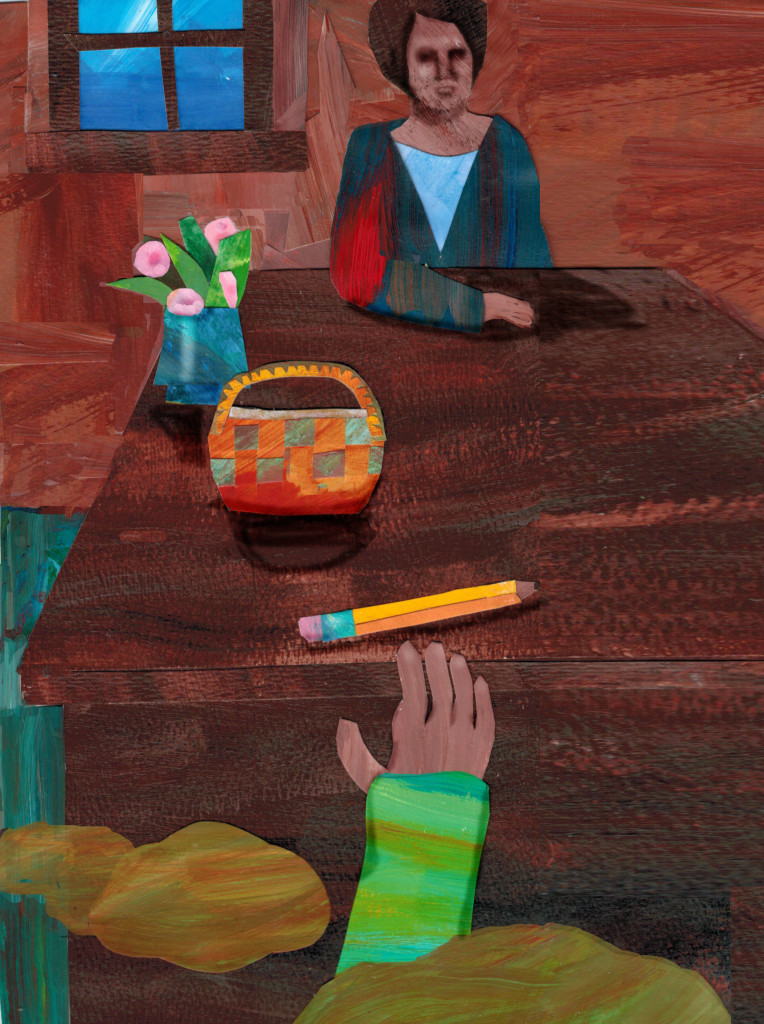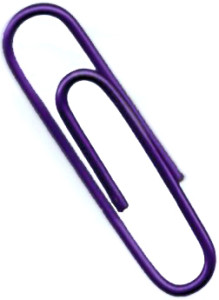
 Sweeping, dusting, and occasionally even scrubbing–digging out collage pieces from between the sofa cushions, recycling old bottles of toilet cleaner, sorting papers from the dozen classes, workshops, and seminars one or the other of us taught in the past year–Hubby and I have managed to clean the Micropalace! Thankfully, we have downgraded our condition from CHAOS (Can’t Have Anyone Over Syndrome, a term coined by Maria Cilley, doyenne of de-cluttering) to a run-of-the-mill case of CHaMSOS, and we’re both at peace with the idea that we Can’t Have Martha Stewart Over.
Sweeping, dusting, and occasionally even scrubbing–digging out collage pieces from between the sofa cushions, recycling old bottles of toilet cleaner, sorting papers from the dozen classes, workshops, and seminars one or the other of us taught in the past year–Hubby and I have managed to clean the Micropalace! Thankfully, we have downgraded our condition from CHAOS (Can’t Have Anyone Over Syndrome, a term coined by Maria Cilley, doyenne of de-cluttering) to a run-of-the-mill case of CHaMSOS, and we’re both at peace with the idea that we Can’t Have Martha Stewart Over.
I grew up wearing the scarlet M of the messy kid, lacking the skills, and sometimes the willingness, to manage my possessions and my time. Hubby, on the other hand, is a very tidy individual whose possessions nonetheless accumulate in archaeological layers. My messiness arises from eternal optimism: Really soon I’m going to finish that painting project, wear that sweater again, reuse that handout, and find a purpose for all my empty roller-ball pens and a stack of 47 green plastic fruit baskets. Hubby’s comes from hardworking single-mindedness; areas outside of his range of laser focus tend to blur.
 Since the clean-up, we can reach our bookshelves without climbing over anything. We can get into the bathroom without crab-walking. And, heaven help us, we now live in fear. Specters of distraction, fatigue, irritability, and laziness–the four horsemen of the dishpocalypse–haunt our kitchen area. What will happen to our newly uncovered floor space if we lapse into old ways? What if we can’t keep up with the forces of nature? Our apartment, which nestles up against a damp hillside, tends perniciously toward mildew. Herds of dust buffaloes–black, furry, hump-backed, mycotoxic grime balls–thunder through our dreams.
Since the clean-up, we can reach our bookshelves without climbing over anything. We can get into the bathroom without crab-walking. And, heaven help us, we now live in fear. Specters of distraction, fatigue, irritability, and laziness–the four horsemen of the dishpocalypse–haunt our kitchen area. What will happen to our newly uncovered floor space if we lapse into old ways? What if we can’t keep up with the forces of nature? Our apartment, which nestles up against a damp hillside, tends perniciously toward mildew. Herds of dust buffaloes–black, furry, hump-backed, mycotoxic grime balls–thunder through our dreams.
To keep the place “airy”–that’s our watchword–we’re planning on doing lots of chummy, domestic reciprocal nagging. Rather than ban “bossy,” we celebrate the concept (within limits). House rules say that I can boss him around as long as I push him to do things he actually wants to do. As for me, I’m too defensive to take suggestions, but I can be led by example. 
If shared self-discipline falters (hopefully, even if it doesn’t) we’ll fall back on a time-tested housekeeping method: Having People Over. If anything can conquer chaos, it’s love.
Shame alone doesn’t work. I’m pretty sure of that. When notebooks misplace themselves or homework gets left in a locker at school, the parents of one or another of my tutoring clients may encourage me to scold the student, calling on me to take a stand when I don’t have a leg to stand on. I wind up telling the kid, “I lose things, too. All you can do is keep trying.”
Understandably, the parents worry that, their child, if left unchastised, will some day show up unprepared for college seminars or disheveled at job interviews. Such situations must be prevented if possible, of course. On the other hand, should disorder prove inevitable, head-hanging will magnify the self-sabotage.
 In fact, a chin-up, results-oriented approach has seen me through potential mishaps. In my tender twenties, I had an meeting with the University of Pittsburgh’s Assistant Vice President for News and Publications, a cheerful, compact, authoritative woman in a navy blue suit. At this informational interview, which would ultimately lead me to my first professional writing job, I reached around in purse for a pen and found no writing implements at all.
In fact, a chin-up, results-oriented approach has seen me through potential mishaps. In my tender twenties, I had an meeting with the University of Pittsburgh’s Assistant Vice President for News and Publications, a cheerful, compact, authoritative woman in a navy blue suit. At this informational interview, which would ultimately lead me to my first professional writing job, I reached around in purse for a pen and found no writing implements at all.
Note-taking in an informational interview is only polite, and on top of that the AVP was giving me the job number of a position I could apply for. Could I have been more scattered? My self-esteem imploded but, through the dust that rose from the rubble, I scanned the woman’s desk and palm one of her pens. Used it and put it back, too, without her noticing. It made a funny story six years later at the goodbye party they threw me when I left that job.
For a long time my own mother fretted over my organizational habits, tucking tags into my collar, letting me know I’d misbuttoned my blouse, shaking her head when I lost my shoes again. Once or twice, she went so far as to reorganize my apartment for me while I was at work. 
When I got married, she let go of any efforts to improve me–not because I had pulled my life together, and not because I was someone else’s responsibility. On the morning of my wedding, 38 years after I made my first mess (in some hospital diaper), my mother had to send my step-sister out to buy replacements for the white satin slippers I couldn’t find in my closet. With some relief, I imagine, she finally saw that tidying me up was a hopeless cause.
More recently, she has spoken comforting words: “You lose your shoes because you are thinking about other things, important things.” It’s true that most of my redding up (that’s Pittsburghese for cleaning) takes place in my mind. My instincts as a visual artist compel me to pocket bolts and washers and ceramic pieces from the sidewalk, for eventual inclusion in a sculpture or mosaic. Likewise, my mind gathers observations and stories, trying to piece them into meaningful forms.
I take comfort, too, in the notion that simply as human beings, we are all born organizers. Our complex brains transform the sunlight into new forms of energy–gardens and bicycles, soccer teams and law courts, temper tantrums, fantasies, and jokes.
Some scientists theorize that the cosmos will someday have spent all of this energy, reaching a state where neither fires nor computers nor life can exist. Through our mere existence–our work, our emotions, our breath, we are dancing out anti-entropic patterns on the path to the heat death of the universe. Let’s snap our homework into our binders, dust the cobwebs from the corner, and clear the paperclips from the laser printer–in exultation rather than in fear. Chaos will win in the end, but not today.